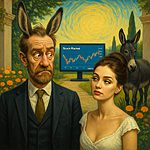Master Your Mind: Untrain to Win!
Jan 23, 2025
Every trading day, thousands of individuals pour into volatile markets, convinced they’re one smart move away from untold gains—yet research consistently shows that up to 90% of new traders ultimately fail. This grim figure is unsettling enough, but the real shock is how preventable many of these failures are. The key often lies not in memorizing charts or chasing hot tips but in harnessing metacognition: the active, deliberate oversight of one’s thinking. By rewiring the trader’s mindset to observe beliefs, biases, and decision-making patterns, practitioners can step off the conveyor belt of losses and into a more strategic and self-aware approach. Put: rewire your mind, or do nothing and watch your account balance wither.
OVERVIEW: DEFINING METACOGNITION IN TRADING
Metacognition—the process of thinking about one’s thinking—represents a vital skill that separates disciplined traders from those acting blindly on impulse. While novices might scan headlines and charts for “sure bets,” experienced traders appreciate that emotional triggers, cognitive biases, and unexamined habits can sabotage even the best reading of market data. By becoming consciously aware of these influences, individuals can course-correct in real time, refining the reasoning behind each trade.
For example, when a trader notices repeated tendencies to “average down” on a losing position out of fear or pride, metacognitive awareness can interrupt the pattern, prompting an honest appraisal: Is the market truly mispricing this asset, or is ego fueling poor judgment? Through such introspection, an aspiring professional learns to differentiate between rational conviction and stubbornness—or, worse, desperation.
THE DANGERS OF UNEXAMINED BIASES
Markets are rife with powerful emotional undertows. Without self-awareness, traders can slide into confirmation bias, seeking only evidence that validates preconceived notions. Overconfidence bias leads some to ignore critical signals—particularly after a streak of profitable trades—believing themselves impervious to market reversals. A classic historical example emerged in the 1990s with Long-Term Capital Management, a hedge fund led by brilliant economists and Nobel laureates. Their models were exceptionally sophisticated, yet overconfidence and insufficient attention to rare but catastrophic events triggered a colossal collapse.
By contrast, traders who build metacognitive reflexes recognize that bias is inevitable. Rather than deny it, they watch for indicators that pride or panic has seized their thought process. This vigilance can mean re-checking an equity’s fundamentals before doubling down, or speaking honestly with trusted peers who might spot a flawed assumption or hasty conclusion. It’s not about never being wrong—everyone is at times—but about systematically identifying blind spots before they do lasting damage.
EXAMPLE: SHORT-CIRCUITING THE DESPERATION TRADE
Consider a retail trader who’s watched the broader market climb for weeks while their portfolio lags. The frustration grows, paired with envy, as they see social media posts flaunting lucky gains. When a hot tip surfaces—some start-up rumoured to be “the next Amazon”—they’re tempted to go all-in. As adrenaline spikes, they ignore deeper analysis and the fact that half their chosen stock picks in the past year turned sour under similar conditions.
Metacognition intervenes by forcing the question: “Am I betting on genuine fundamentals, or am I compensating for missed opportunities?” If the answer reveals an emotional chase, the trader can pause, gather data, verify claims, or even consult an objective observer’s viewpoint. By slowing down and scrutinizing one’s internal drives, the impulse to make a desperation trade is defanged, warding off losses that often follow such reckless gambles.
REWIRING THE MIND THROUGH ROUTINE REFLECTION
Building metacognition isn’t an overnight fix; it requires regular practice and a structured approach. Many successful traders follow a four-step framework:
- Pre-Trade Analysis: They identify the rationale in writing before buying or selling. What market conditions, fundamental metrics, or technical signals support this move?
- Emotion Check: They assess their emotional state, including energy level, stress, and excitement. Are they fueled by impatience or fear of missing out (FOMO)? Recognizing those feelings can avert hasty decisions.
- Post-Trade Review: They evaluate the actual outcome versus their initial hypothesis after exiting a position. What worked? What failed?
- Adjustment: Drawing on step three, they update their trading plan, watchlists, and risk controls. Over time, these iterative tweaks sharpen both intuition and analytical rigour.
Real-world example: a day trader notices a pattern of cutting winners too early due to anxiety about sudden reversals. Through daily reflections, they dissect how this habit arises—perhaps they once got burned by a market downturn while absent from the screen. Now, they’re overly cautious. The trader converts a self-defeating habit into a systematic adjustment by consciously spotting this bias, setting more precise stop-loss levels, or adopting partial profit-taking strategies.
NEUROSCIENCE AND EMOTIONAL AGILITY
Recent neuroscience findings affirm that the brain’s emotional centers—particularly the amygdala—play a powerful role in quick, reflexive reactions. With their constant updates and financial stakes, trading floors bombard the brain’s threat-detection systems. Accordingly, rational judgment can be drowned out by fear and greed.
Metacognition counters this with emotional agility. The trader learns to identify escalating stress, deploying coping methods such as mindful breathing or stepping away from the screen for brief intervals. Rather than letting adrenaline hijack the executive functions in the prefrontal cortex, they maintain a balanced vantage point from which to interpret price movements. The difference between a meltdown and coolheaded adaptation often lies in subtle self-awareness: “I feel anxious; let me confirm if that aligns with actual chart signals.”
LESSONS FROM PROFESSIONALS
Many institutional traders incorporate dedicated reflection periods into their routines. They might track metrics like risk/reward ratios, batting averages (winning vs. losing trades), or how closely real execution matched planned strategy. They’ll also swap insights with colleagues who act as sounding boards for emotional slip-ups or logical fallacies. Such discipline underpins consistent gains.
In contrast, amateurs can be so enthralled by market euphoria or paralyzed by fear that they skip any structured evaluation. Lured by easy onboarding on trading apps, they leap from one meme stock to the next. Most will discover, too late, that fleeting hype rarely translates to sustained profitability. Meanwhile, those who treat trading like a craft—practising reflection, emotional management, and continuous learning—tend to outlast and outperform the crowd in the long run.
THE COST OF INACTION
Failure to engage in metacognition can lock traders in a repetitive cycle of mistakes: chasing breakouts after they peak, holding onto losers out of denial, or panic-selling just before price rebounds. Each misstep erodes capital and chips away at morale. Over time, these self-inflicted wounds spark exasperation, culminating in abandoning the market altogether: “Trading’s rigged,” they conclude, “I can’t win.” But the truth is, without rewiring the mindset to anticipate and correct faulty patterns, the losing loop is all but guaranteed.
TRADING AS INTELLECTUAL COMBAT
Market speculation is often likened to intellectual combat—opponents include other participants and one’s own mind. Novice traders might rely solely on “gut instinct,” ridiculing the notion that introspection, journaling, or feedback loops matter. Yet the best know: success in trading is partly about strategy, partly about reading the crowd, but mostly about managing the complex interplay of personal psychology amid unpredictable data streams.
Thus, metacognition becomes the thread stitching all these elements together. It highlights how and why we form certain expectations, when emotions warp objectivity, and which corrective steps consistently enhance outcomes. Without that layer, even well-researched trades can flop under the weight of unacknowledged biases.
CONCLUSION: A CHOICE THAT DEFINES OUTCOMES
Metacognition is neither mysterious nor optional: it’s a practical, learnable skill that can redefine a trader’s success trajectory. Brutal market losses often signal not poor market conditions but a neglected inner dialogue—a failure to adjust when the data or emotional tone shifts. Only by making one’s own thought processes visible, probing them for error, and adapting accordingly can a trader hope to thrive consistently.
For the aspiring or frustrated trader, the choice is clear: embrace metacognition to continually evolve, or do nothing substantial and risk a drawn-out slide into the 90% that fail. Whether scalping currency pairs, swing trading growth stocks, or managing a long-term portfolio, rewiring your mental approach can mean distinguishing between a robust trading record and a cautionary tale. In a game as unforgiving as finance, few decisions carry more weight.
Shattering Limits: The Art of Mental Exploration















